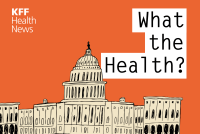Latest KFF Health News Stories
Look Up Your Hospital: Is It Being Penalized By Medicare?
Each year, Medicare punishes hospitals that have high rates of readmissions and high rates of infections and patient injuries. Check out which hospitals have been penalized.
The Real Costs of the New Alzheimer’s Drug, Most of Which Will Fall to Taxpayers
The annual cost of lecanemab treatment quadruples if the expense of brain scans to monitor for bleeds and other associated care is factored in. The full financial toll likely puts it beyond reach for low-income seniors at risk of Alzheimer’s, experts say.
KFF Health News' 'What the Health?': Let’s Talk About the Weather
It’s been the summer of broken weather records around the world — for heat, rain, and wildfire smoke — advertising the risks of climate change in a big way. But, apparently, it’s not enough to break the logjam in Washington over how to address the growing climate crisis. Meanwhile, in Texas, women who were unable to get care for pregnancy complications took their stories to court, and Congress gears up to — maybe — do something about prescription drug prices. Alice Miranda Ollstein of Politico, Shefali Luthra of The 19th, and Rachel Cohrs of Stat join Julie Rovner, KFF Health News’ chief Washington correspondent, to discuss these issues and more. Also this week, Rovner interviews Meena Seshamani, the top administrator for the federal Medicare program.
How a Medical Recoding May Limit Cancer Patients’ Options for Breast Reconstruction
The federal government’s arcane process for medical coding is influencing which reconstructive surgery options are available, creating anxiety for breast cancer patients.
Falta de doctores y residencias médicas impactan en la salud de las zonas rurales
Expertos dicen que los factores sistémicos son barreras comunes para establecer y mantener programas de capacitación para médicos en las zonas rurales de Estados Unidos.
Doctor Shortages Distress Rural America, Where Few Residency Programs Exist
Patients in rural northeastern Nevada soon will have fewer providers and resources, after a local hospital decided to close its medical residency program. Nationally, the number of rural residency slots has grown during the past few years but still makes up just 2% of programs and residents nationwide.
The Big Squeeze: More Enrollees and Smaller Networks Plague Some ACA Plans
Despite record enrollment in health insurance plans under the Affordable Care Act, some consumers who bought coverage and agents who helped them do so have had a tough start to the new year: Many say it’s hard to find an in-network doctor or hospital.
A Progress Check on Hospital Price Transparency
Hospitals are facing mixed reviews regarding their efforts to comply with a federal requirement that they post information about prices related to nearly every health care service they provide.
Congressman Seeks to Plug ‘Shocking Loophole’ Exposed by KHN Investigation
A federal lawmaker has introduced a House bill that would close one of a laundry list of oversight gaps revealed in a recent KHN investigation of the system regulators use to ban fraudsters from billing government health programs, including Medicare and Medicaid.
Feds Move to Rein In Prior Authorization, a System That Harms and Frustrates Patients
The federal government wants to change the way health insurers use prior authorization — the requirement that patients get permission before undergoing treatment. Designed to prevent doctors from deploying expensive, ineffectual procedures, prior authorization has become a confusing maze that denies or delays care, burdens physicians with paperwork, and perpetuates racial disparities. New rules may not be enough to solve the problems.
Hospitales rurales aplican a nuevo programa federal para intentar sobrevivir
Más de 140 hospitales rurales han cerrado en todo el país desde 2010, y observadores de políticas de salud no están seguros de cuántas de las más de 1,700 instalaciones rurales elegibles para la nueva designación aplicarán a un nuevo programa.
Struggling to Survive, the First Rural Hospitals Line Up for New Federal Lifeline
Hospitals in New Mexico, Texas, and Oklahoma are among the first to apply for a new rural hospital payment model that shifts the focus of services away from overnight stays to outpatient and emergency care. Still, experts say the law needs to be amended to provide the right mix of care for rural communities.
Idaho Dropped Thousands From Medicaid in the Pandemic’s First Years
The removals, detailed in emails between state and federal health officials, hinged on disagreements over how states could disenroll people during the public health emergency. Consumer advocates fear the alleged violation signals the mess to come on April 1, when the pandemic-era Medicaid coverage mandate ends.
Proposed Medicare Advantage Changes Cannot Accurately Be Called ‘Cuts,’ Experts Say
CMS advanced two proposed changes that could affect Medicare Advantage plans. One would allow the government to recover past overpayments. As a result, it could reduce those insurers’ profits, leading them to increase enrollees’ out-of-pocket costs or reduce benefits. But it’s inaccurate to characterize the changes as “cuts.”
Millones en riesgo de perder Medicaid, mientras terminan protecciones por la pandemia
Los estados se están preparando para remover a millones de personas de Medicaid, a medida que expiran las protecciones que se implementaron al comienzo de la pandemia de covid-19.
As Pandemic-Era Medicaid Provisions Lapse, Millions Approach a Coverage Cliff
States are trying to reach millions of Medicaid enrollees to make sure those still eligible remain covered and help others find new health insurance.
Nursing Home Owners Drained Cash During Pandemic While Residents Deteriorated
As the federal government debates whether to require higher staffing levels at nursing homes, financial records show owners routinely push profits to sister companies while residents are neglected. “A dog would get better care than he did,” one resident’s wife said.
Government Lets Health Plans That Ripped Off Medicare Keep the Money
In a surprise decision, U.S. officials yield to insurance industry demands — at least for now.
Did Your Health Plan Rip Off Medicare?
KHN has released never-before-seen details of federal audits as the government weighs action against dozens of Medicare Advantage plans.
Medicare Pay Cuts Will Hurt Seniors’ Care, Doctors Argue
New reductions in Medicare payments in 2023 will drive more doctors away from accepting Medicare patients, physicians say. They are again pushing back on efforts largely designed to control government spending.





















